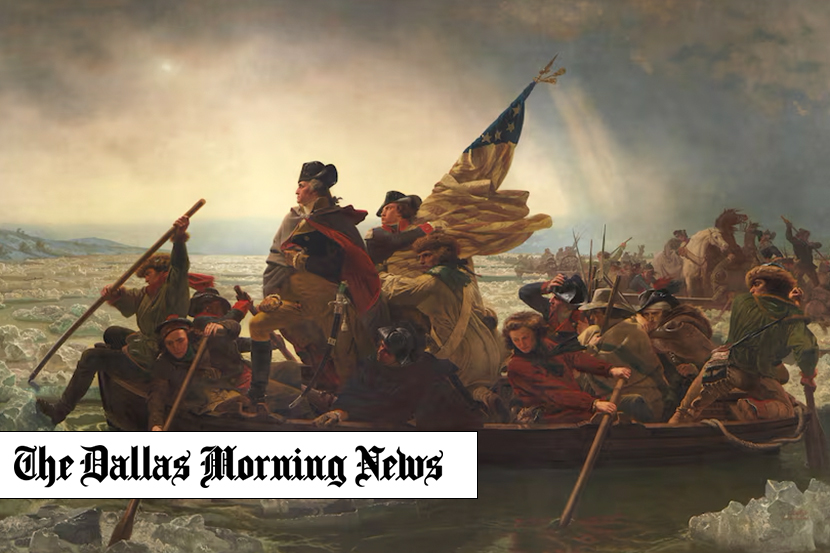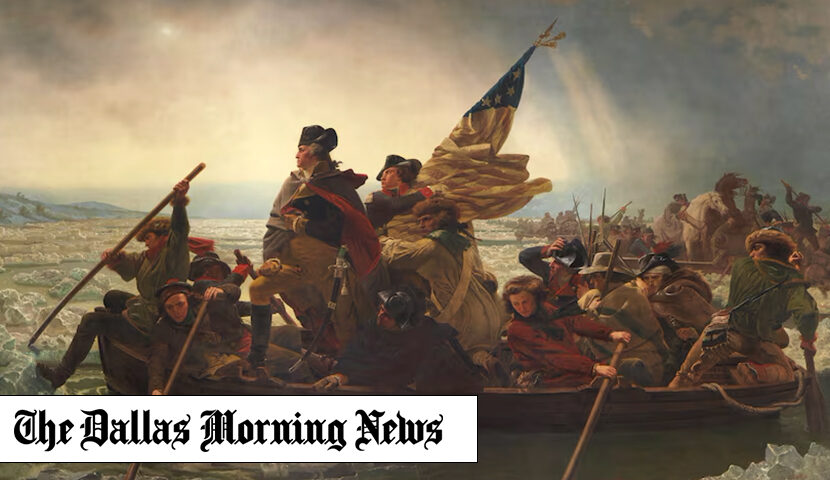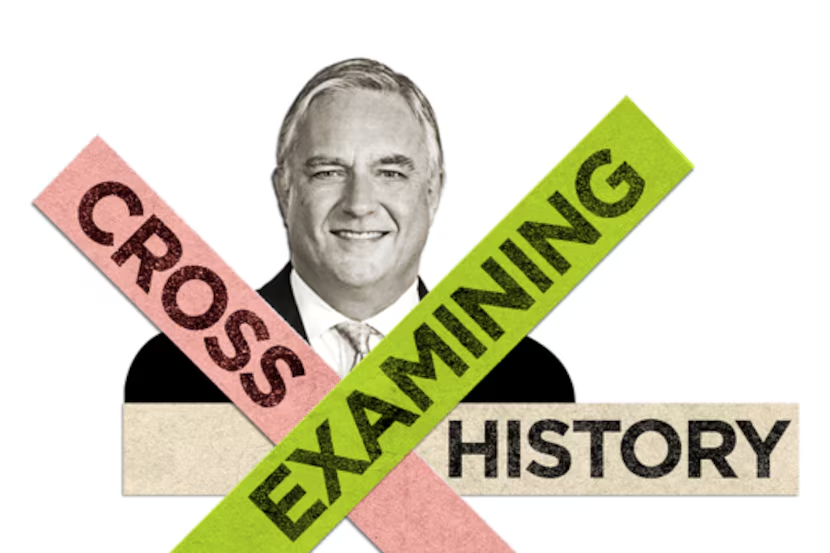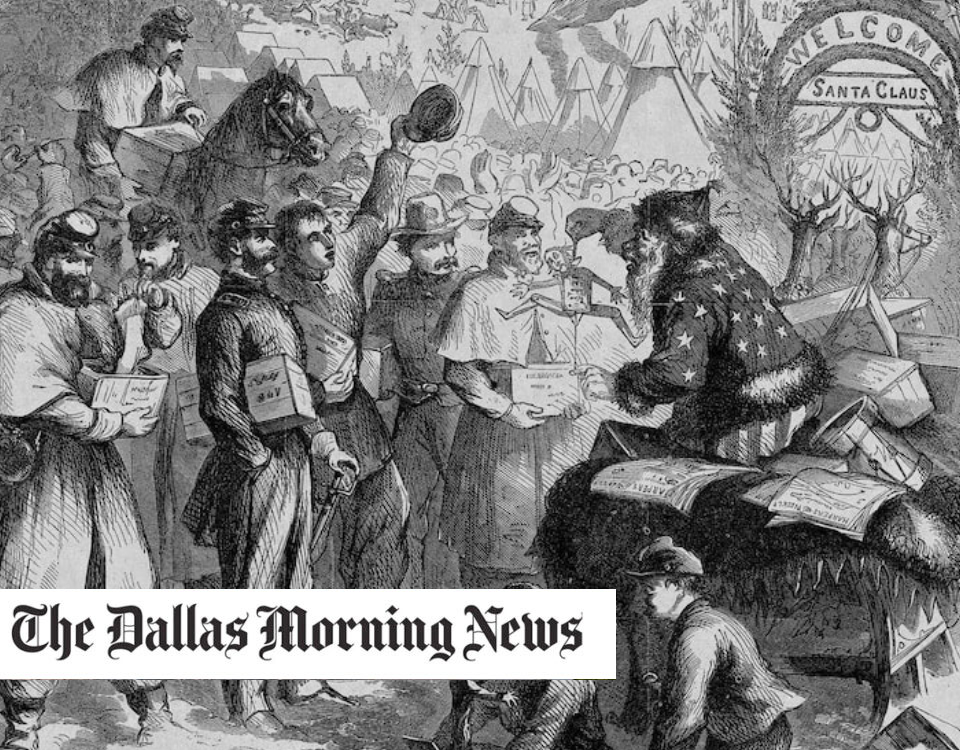
In this photo from the Metropolitan Museum of Art is the 1851 oil on canvas painting by Emanuel Leutze titled “Washington Crossing the Delaware.” One soldier’s description of the river crossing in 1776, writes Talmage Boston: “It rained, hailed, snowed, and froze, and at the same time blew a perfect hurricane.”(Emanuel Leutze / AP)Contributing Columnist Talmage Boston(Michael Hogue)
Boston: On the first American Christmas, Washington’s leadership saved the republic
Remember Big George this holiday.
Those of us blessed to live in this land of the free and home of the brave allow most Christmases to pass without remembering one of the most important events in American history: George Washington’s heroics on Dec. 25, 1776, and the days that followed, that proved to be the tipping point toward victory in the Revolutionary War.
Because of Big George’s Christmas Day leadership, we gained “the sacred fire of liberty” and “republican model of government” (words from his First Inaugural Address in 1789) that have served us so well for so long.
Shortly after the Declaration of Independence was signed in July 1776, America’s military effort appeared doomed to fail after defeat at the Battle of Brooklyn in August, the taking of Fort Washington on Manhattan Island in November, and the subsequent retreat through New Jersey. Hopes for success were dying and colonial soldiers counted the days until their service commitments expired at year’s end.
The situation drove Washington to acknowledge in a Dec. 10 letter, “One’s imagination can scarce extend to a situation more distressing than mine. Our only dependence now is upon the speedy enlistment of a new army. If this fails, I think the game will be pretty well up.”
In his biography of Washington, Ron Chernow described what his subject saw when he looked at his troops that December: “A beleaguered rump army, a raggedy band of a few thousand men who had worn out their shoes and crafted makeshift footwear by slaughtering cattle, skinning their hides, and wrapping crude sections around their bare feet. … Years later, he remembered that in that moment, he ‘trembled for the fate of America.’”
In his book 1776, David McCullough wrote that soon after that moment, Gen. Nathanael Greene observed that his boss, “never appeared to so much advantage as in the hour of distress.”
Washington wrote to a friend about the prospect of his having a “brilliant stroke” that might save the cause. A few days later, he predicted landing “a lucky blow against the enemy that would most certainly rouse the spirits of the people, who are quite sunk by our misfortunes.”
Washington proceeded to devise and execute the “brilliant stroke” and “lucky blow” plan that changed the course of the war. It started on Christmas night.
Thinking the enemy would be relaxed that holiday evening at their garrison in Trenton, N.J., Washington planned to have his men, horses and cannons depart from their camp in Pennsylvania and cross the nearby Delaware River in flat-bottomed boats normally used to transport pig iron. Upon reaching the other side, they would then march 10 miles to their destination.
The plan went forward that night despite a gathering storm and the river’s being filled with broken sheets of ice. His password for the daring venture — Victory or Death — aligned with his orders: “No man to quit his ranks on pain of death.
To inspire his troops before they left camp, Washington had a passage from Thomas Paine read aloud: “These are the times that try men’s souls. The summer soldier and the sunshine patriot will, in this crisis, shrink from the service of their country; but he that stands it now deserves the love and thanks of all people.”
As the men got in the boats to cross the river, the storm hit. One soldier’s description: “It rained, hailed, snowed, and froze, and at the same time blew a perfect hurricane.”
Chernow believed “Crossing the Delaware on Christmas night, Washington knew, would produce either storied success or utter calamity, and he was ready to pay the price. … With the country’s future riding on his shoulders, he displayed indomitable tenacity. If the raid backfired, the war was likely over and he would be captured and killed.”
The ice slowed the paddle and pole-driven boats and those who made it didn’t get across the river until 3 a.m., putting them three hours behind schedule.
Before their departure, Washington divided his men into three separate regiments meant to land at three different places on the banks of Delaware, but two of the groups never made it across the river.
Regardless of the storm delay and manpower reduction, Washington knew retreat was impossible. “I was determined to push on at all events,” he wrote.
The march toward Trenton was made by the remaining 2,400 men over steeply sloped rain-slicked terrain and in weather so severe two of them froze to death.
The commander-in-chief rode up and down the rows of his drenched and freezing soldiers, keeping them focused on the challenge at hand. Upon reaching their destination, many of the men’s guns were so rain-soaked they couldn’t fire. Washington’s Plan B command: “Use the bayonet.”
An hour after daylight, with the storm still raging, the attack began. It lasted about 45 minutes. Despite their fatigue and lack of firepower, Washington said every American soldier “vied with the other for pressing forward.” The result: The enemy had 21 soldiers killed, 90 wounded, 900 taken prisoner, and 500 escaped, while the Americans suffered only four wounded (one being future president James Monroe) and no one killed.
After the battle, Washington delivered a glowing message to his men, thanking them for “their spirited and gallant” effort, since he had “not seen a single instance of bad behavior in either officers or privates.”
He told Maj. James Wilkinson, “This is a glorious day for our country.” In fact, it proved to be the day that saved our country.
When news of the victory at Trenton arrived at the Continental Congress, John Hancock could see that, although it had been achieved by men “broken by fatigue and ill-fortune,” Washington’s leadership deserved credit: “Troops properly inspired and animated by a just confidence in their leader will often exceed expectations. As it is entirely to your wisdom and conduct, the United States are indebted for the success of your arms.”
Four days after the victory, Washington succeeded in persuading his troops to renew their military service commitment into the new year. When they did, Gen. Greene decided it was “God Almighty who inclined their hearts to listen to the proposal and they engaged anew.” Additional men soon volunteered and by August 1777, the army’s size had grown to 12,000.
Washington led his troops to another triumph in early January at the Battle of Princeton.
McCullough drew this conclusion about the back-to-back victories: “As thrilling as the news of Princeton was for the country, coming so quickly after the triumph at Trenton, it was Trenton that meant the most. Trenton and the night crossing of the Delaware were rightly seen as a great turning point. With that victory came the realization that Americans had bested the enemy, outsmarted them and outfought them, and so might well again.”
On Christmas night 1776, George Washington kept our Continental Army “spirited and gallant” in its darkest hours, and thereby delivered the “brilliant stroke” and “lucky blow” needed for America to obtain her independence from England.
At Christmastime 2024, many of us with our bellies full, homes warm and stockings filled, in the greatest country in the world, let’s take a minute to give thanks for our first president and that first American Christmas.




